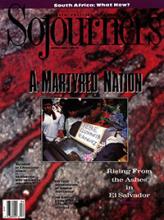A Call to Action
REMEMBER THE LIVING QUARTERS of the murdered Jesuit priests and the two women -- the blood-stained walls, the shattered glass, the bullet holes in the concrete walls. The blood-stained floors of the individual rooms were a stark contrast to the sitting room of the living area, where rocking chairs still encircled a table that held cups of unfinished coffee and ashtrays with crushed-out cigarette butts, representing an evening of conversation and closing evening prayer.
For me, it was in those moments of hearing the detailed story of the night of murder and violence that the impact of those eight murders -- and the 75,000 other murders -- finally was stored in my heart and soul.
I'd seen death, pain, and destruction in many other situations, but this, in a place of peace broken by the horror of evil, was once again a reminder of people's inhumanity to people. Yet it was also a reminder of the incredible power of the gospel message of freedom and liberation.
As I struggled to control the throbbing in my heart, someone showed me one of the bullets that investigators had found at the site -- and on it was stamped "Made in the U.S.A."
Maybe it was later, or maybe it was at that moment, but I was struck by the depth of responsibility that we as U.S. citizens and as U.S. churches carry in this bloody conflict; and the need for us as church people to call for repentance for our complicity in the ongoing terror, death, and destruction of the Salvadoran people.
It is a call that comes from the understanding that out of the depths of great pain and human destruction come life, celebration, and salvation. Yet often when we in the First World call for repentance, we repent, we weep, we are sorrowful; and just as quickly we move on to celebration and salvation. We often forget the final step which is the call to action.
Read the Full Article

